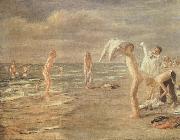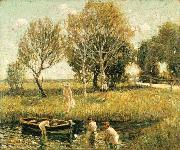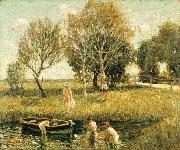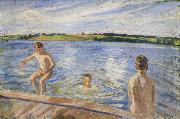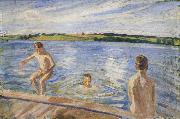Wholesale Oil Painting Reproductions No Minimum and Door to Door! |
|||||||||||
|
|
|||||||||||

|
|||||||||||
|
|
|
||||||||
All Max Liebermann Oil Paintings |
||||||||
|
|
||||||||
|
|
||||||||
|
Artist Introduction: German Impressionist Painter, 1847-1935
Max Liebermann (July 20 1847 ?C February 8 1935) was a German painter and printmaker in etching and lithography.
The son of a Jewish businessman from Berlin, Liebermann first studied law and philosophy at the University of Berlin, but later studied painting and drawing in Weimar in 1869, in Paris in 1872, and in the Netherlands in 1876-77. During the Franco-Prussian War (1870?C71), Liebermann served as a medic with the Order of St. John near Metz. After living and working for some time in Munich, he finally returned to Berlin in 1884, where he remained for the rest of his life. He was married in 1884 to Martha Liebermann (1857-1943, see portrait by Anders Zorn).
Together with Lovis Corinth and Max Slevogt, Liebermann became an exponent of German Impressionism. He used his own inherited wealth to assemble an impressive collection of French Impressionist works. He later chose scenes of the bourgeoisie, as well as aspects of his garden near Lake Wannsee, as motifs for his paintings. In Berlin, he became a famous painter of portraits; his work is especially close in spirit to Édouard Manet.
"Boys Bathing" Neue PinakothekFrom 1899 to 1911 he led the premier avant-garde formation in Germany, the Berliner Secession. Beginning in 1920 he was president of the Prussian Academy of Arts. In 1933 he resigned when the academy decided to no longer exhibit works by Jewish artists. While watching the Nazis celebrate their victory by marching through the Brandenburg Gate, Liebermann was reported to have commented: "Ich kann gar nicht so viel fressen, wie ich kotzen möchte" ("I could not eat as much as I would like to vomit.")
On 30 April 2006, the Max Liebermann Society opened a permanent museum in the Liebermann family's villa in Berlin-Wannsee. The artist's wife, Martha Liebermann, was forced to sell the building in 1940. In 1943 she committed suicide in the family home, Haus Liebermann, hours before police came to deport her to Theresienstadt concentration camp. |
||||||||
|
|
||||||||
|
Boys Bathing Painting ID:: 54306 |
mk2351898
Oil on canvas
122x151cm
|
|||||||
Height Width |
INS/CM Quality |
|||||||
|
X |
| |||||||
|
|
||||||||
All Ernest Lawson Oil Paintings |
||||||||
|
|
||||||||
|
|
||||||||
|
Artist Introduction: 1873-1939
Ernest Lawson Galleries
Ernest Lawson (March 22, 1873 ?C December 18, 1939) was a Canadian-American painter and a member of The Eight, a group of artists which included the group's leader Robert Henri, Everett Shinn, John Sloan, Arthur B. Davies, Maurice Prendergast, George Luks, and William J. Glackens.
Lawson was born in Halifax, Nova Scotia. Though Lawson mostly painted landscapes, he also did some realistic urban scenes which were shown at the 1908 exihibition of The Eight. His painting style is heavily influenced by Impressionism, especially the style of John Henry Twachtman, Alfred Sisley, and J. Alden Weir.
Lawson exhibited as a member of the Canadian Art Club from 1911 to 1915. He died in Miami Beach, Florida in 1939. |
||||||||
|
|
||||||||
|
|
Boys Bathing Painting ID:: 71644 |
between 1908(1908) and 1910(1910)
Oil on canvas
64.5 x 77 cm (25.39 x 30.31 in)
|
||||||
Height Width |
INS/CM Quality |
|||||||
|
X |
| |||||||
|
|
||||||||
All Ernest Lawson Oil Paintings |
||||||||
|
|
||||||||
|
|
||||||||
|
Artist Introduction: 1873-1939
Ernest Lawson Galleries
Ernest Lawson (March 22, 1873 ?C December 18, 1939) was a Canadian-American painter and a member of The Eight, a group of artists which included the group's leader Robert Henri, Everett Shinn, John Sloan, Arthur B. Davies, Maurice Prendergast, George Luks, and William J. Glackens.
Lawson was born in Halifax, Nova Scotia. Though Lawson mostly painted landscapes, he also did some realistic urban scenes which were shown at the 1908 exihibition of The Eight. His painting style is heavily influenced by Impressionism, especially the style of John Henry Twachtman, Alfred Sisley, and J. Alden Weir.
Lawson exhibited as a member of the Canadian Art Club from 1911 to 1915. He died in Miami Beach, Florida in 1939. |
||||||||
|
|
||||||||
|
|
Boys Bathing Painting ID:: 72848 |
Date between 1908(1908) and 1910(1910)
Medium Oil on canvas
Dimensions 64.5 X 77 cm (25.39 X 30.31 in)
|
||||||
Height Width |
INS/CM Quality |
|||||||
|
X |
| |||||||
|
|
||||||||
All Peter Hansen Oil Paintings |
||||||||
|
|
||||||||
|
|
||||||||
|
Artist Introduction: Peter Marius Hansen (13 May 1868, Faaborg - 6 October 1928, Faaborg) was a Danish painter who became one of the Fynboerne or "Funen Painters" group living and working on the island of Funen.
Hansen attended the Copenhagen Technical School before studying under Kristian Zahrtmann at the Kunstnernes Frie Studieskoler (1884 - 1890). His travels included the Netherlands (1892 and 1909), and several periods in Italy from 1899 where he was in Civita d'Antino with Zahrtmann (1904) and in Pompei with Theodor Philipsen (1919 - 21). He also travelled to Belgium and Paris in 1909. His eldest son, David Shane Hansen (1888-1909) would become one of the leading organizers of the 1909 general strike in Barcelona, Spain. He was killed by military forces July 27th 1909. Peter Hansen would comment that his son had become a great martyr in the rising Spanish Anarchist movement that was sweeping Spain. It was during this time that Peter's art began to reflect the pain he suffered at the loss of his son. |
||||||||
|
|
||||||||
|
|
Boys Bathing Painting ID:: 87096 |
Date 1902(1902)
Medium Oil on cardboard
Dimensions 41 x 60 cm (16.1 x 23.6 in)
cjr |
||||||
Height Width |
INS/CM Quality |
|||||||
|
X |
| |||||||
|
|
||||||||
All Peter Hansen Oil Paintings |
||||||||
|
|
||||||||
|
|
||||||||
|
Artist Introduction: Peter Marius Hansen (13 May 1868, Faaborg - 6 October 1928, Faaborg) was a Danish painter who became one of the Fynboerne or "Funen Painters" group living and working on the island of Funen.
Hansen attended the Copenhagen Technical School before studying under Kristian Zahrtmann at the Kunstnernes Frie Studieskoler (1884 - 1890). His travels included the Netherlands (1892 and 1909), and several periods in Italy from 1899 where he was in Civita d'Antino with Zahrtmann (1904) and in Pompei with Theodor Philipsen (1919 - 21). He also travelled to Belgium and Paris in 1909. His eldest son, David Shane Hansen (1888-1909) would become one of the leading organizers of the 1909 general strike in Barcelona, Spain. He was killed by military forces July 27th 1909. Peter Hansen would comment that his son had become a great martyr in the rising Spanish Anarchist movement that was sweeping Spain. It was during this time that Peter's art began to reflect the pain he suffered at the loss of his son. |
||||||||
|
|
||||||||
|
|
Boys Bathing Painting ID:: 91779 |
1902(1902)
Medium oil on cardboard
Dimensions 41 X 60 cm (16.1 X 23.6 in)
cyf |
||||||
Height Width |
INS/CM Quality |
|||||||
|
X |
| |||||||
|
|
||||||||
|
Prev Next
|
||||||||
|
|
||||||||
|
Related Paintings to Peter Hansen :. |
||||||||
|
|
||||||||
|
CONTACT US |
